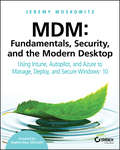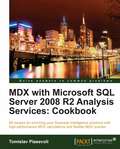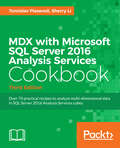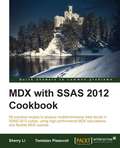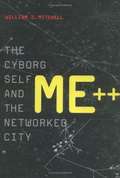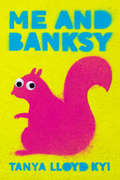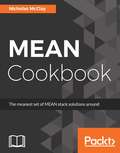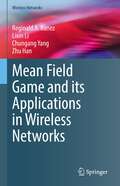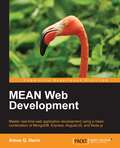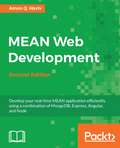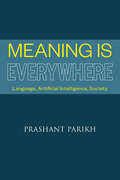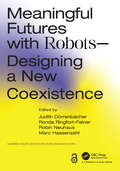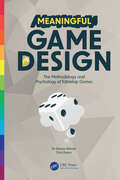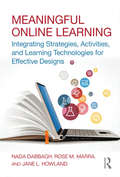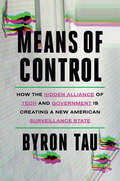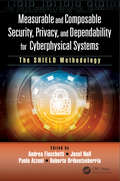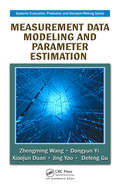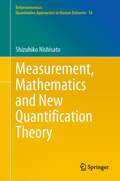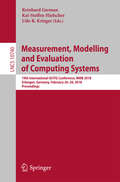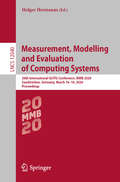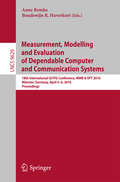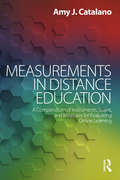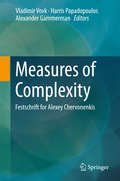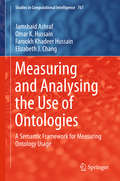- Table View
- List View
MDM: Using Intune, Autopilot, and Azure to Manage, Deploy, and Secure Windows 10
by Jeremy MoskowitzThe first major book on MDM written by Group Policy and Enterprise Mobility MVP and renowned expert, Jeremy Moskowitz! With Windows 10, organizations can create a consistent set of configurations across the modern enterprise desktop—for PCs, tablets, and phones—through the common Mobile Device Management (MDM) layer. MDM gives organizations a way to configure settings that achieve their administrative intent without exposing every possible setting. One benefit of MDM is that it enables organizations to apply broader privacy, security, and application management settings through lighter and more efficient tools. MDM also allows organizations to target Internet-connected devices to manage policies without using Group Policy (GP) that requires on-premises domain-joined devices. This makes MDM the best choice for devices that are constantly on the go. With Microsoft making this shift to using Mobile Device Management (MDM), a cloud-based policy-management system, IT professionals need to know how to do similar tasks they do with Group Policy, but now using MDM, with its differences and pitfalls. • What is MDM (and how is it different than GP) • Setup Azure AD and MDM Auto-Enrollment • New PC Rollouts and Remote Refreshes: Autopilot and Configuration Designer • Enterprise State Roaming and OneDrive Documents Roaming Renowned expert and Microsoft Group Policy and Enterprise Mobility MVP Jeremy Moskowitz teaches you MDM fundamentals, essential troubleshooting techniques, and how to manage your enterprise desktops.
MDX with Microsoft SQL Server 2008 R2 Analysis Services Cookbook
by Tomislav PiasevoliThis book offers practical, task-based, and immediately usable recipes covering a wide range of MDX calculations and queries. In addition to its cookbook style, which ensures the solutions are presented in a clear step-by-step manner, the explanations are done in great detail, which makes it good learning material for everyone who has experience in MDX and wants to improve. The book is designed in such a way that you can read it chapter by chapter or refer to recipes in no particular order. However, some of the recipes depend on each another. When this is the case, you will be notified. The book is focused on Microsoft SQL Server 2008 R2 Analysis Services, but most of the concepts and explanation are also applicable to previous versions of Microsoft SQL Server Analysis Services. If you are a Microsoft SQL Server Analysis Services developer and want to improve your solutions using MDX, then this book is for you. The book assumes you have a working knowledge of MDX and a basic understanding of dimensional modeling and cube design.
MDX with Microsoft SQL Server 2016 Analysis Services Cookbook - Third Edition
by Tomislav Piasevoli Sherry LiOver 70 practical recipes to analyze multi-dimensional data in SQL Server 2016 Analysis Services cubes About This Book * Updated for SQL Server 2016, this book helps you take advantage of the new MDX commands and the new features introduced in SSAS * Perform time-related, context-aware, and business related-calculations with ease to enrich your Business Intelligence solutions * Collection of techniques to write flexible and high performing MDX queries in SSAS with carefully structured examples Who This Book Is For This book is for anyone who has been involved in working with multidimensional data. If you are a multidimensional cube developer, a multidimensional database administrator, or a report developer who writes MDX queries to access multidimensional cube, this book will help you. If you are a power cube user or an experienced business analyst, you will also find this book invaluable in your data analysis. This book is for you are interested in doing more data analysis so that the management can make timely and accurate business decisions. What You Will Learn * Grasp the fundamental MDX concepts, features, and techniques * Work with sets * Work with Time dimension and create time-aware calculations * Make analytical reports compact, concise, and efficient * Navigate cubes * Master MDX for reporting with Reporting Services (new) * Perform business analytics * Design efficient cubes and efficient MDX queries * Create metadata-driven calculations (new) * Capture MDX queries and many other techniques In Detail If you're often faced with MDX challenges, this is a book for you. It will teach you how to solve various real-world business requirements using MDX queries and calculations. Examples in the book introduce an idea or a problem and then guide you through the process of implementing the solution in a step-by-step manner, inform you about the best practices and offer a deep knowledge in terms of how the solution works. Recipes are organized by chapters, each covering a single topic. They start slowly and logically progress to more advanced techniques. In case of complexity, things are broken down. Instead of one, there are series of recipes built one on top of another. This way you are able to see intermediate results and debug potential errors faster. Finally, the cookbook format is here to help you quickly identify the topic of interest and in it a wide range of practical solutions, that is - MDX recipes for your success. Style and approach This book is written in a cookbook format, where you can browse through and look for solutions to a particular problem in one place. Each recipe is short, to the point and grouped by relevancy. All the recipes are sequenced in a logical progression; you will be able to build up your understanding of the topic incrementally.
MDX with SSAS 2012 Cookbook
by Tomislav Piasevoli Sherry LiThis book is written in a recipe-based style packed full of practical tips and techniques to help you analyse multidimensional data stored in SSAS 2012 cubes. If you need to master MDX queries in SSAS, then this book is for you!If you are a Microsoft SQL Server Analysis Services developer and want to improve your solutions using MDX, then this book is for you. This book is also an essential resource for report developers who need to access the multidimensional cubes through the MDX language. The book assumes you have some basic working knowledge of MDX and a basic understanding of dimensional modelling and cube design.
Me++: The Cyborg Self and the Networked City
by William J. MitchellWilliam Mitchell describes the transformation of wireless technology in the hundred years since Marconi; the scaling up of networks and the scaling down of the apparatus for transmission and reception.
Me and Banksy
by Tanya Lloyd KyiA Banksy-style protest against cameras in classrooms brings a group of middle-grade students together. For fans of Rebecca Stead, Susin Nielsen and Gordon Korman. <P><P>Dominica's private school is covered in cameras, and someone is hacking into them and posting embarrassing moments for the whole school to see. Like Ana picking her nose. When Dominica quickly changes her shirt from inside out in what she thinks is the privacy of a quiet corner in the library, she's shocked -- and embarrassed -- to discover a video has captured this and is currently circulating amongst her schoolmates. So mortifying, especially since over the past three years, they've had a half-dozen school talks about social media safety. <P><P>Who has access to the school security cameras and why are they doing this? Dominica and her best friends, Holden and Saanvi, are determined to find out, and in the process start an art-based student campaign against cameras in the classroom.
MEAN Cookbook
by Nicholas McclayOver 50 recipes to create full-stack high-performance web applications using pure JavaScript and the MEAN stack. About This Book • Architect a fully functional stand-alone web application, including the web server, database, and front-end web application • Improve the performance and maintainability of your MEAN stack application with tips for configuration and optimization • Highlights MEAN Stack best practices when working with your application Who This Book Is For If you are a JavaScript developer who wants to create high-performing, modern web applications with the MEAN stack, this is the book for you. Web developers familiar with some parts of the MEAN stack will find this a comprehensive guide to fleshing out the other technologies and skills they need to build all JavaScript web applications. Developers interested in transitioning from other web application stacks to an all-JavaScript environment will find a wealth of information about how to work in a MEAN stack environment. To get the most from this book, you should have a general understanding of web servers and web applications. You are expected to have a basic understanding of running JavaScript, both in a web browser and outside it, using Node.js and the NPM package manager. What You Will Learn • Bootstrap a new MEAN stack web application using Node.js and Express • Build a single-page application (SPA) with Angular and Angular-CLI • Improve browser performance by optimizing your web application resources using Webpack • Model complex JSON object relationships in MongoDB using Mongoose • Debug all the layers of a MEAN stack application, including working with source maps • Build Restful APIs using Express.js and JSON Web Token (JWT) for user authentication • Use automated testing to improve the reliability and quality of your MEAN stack application In Detail The MEAN Stack is a framework for web application development using JavaScript-based technologies; MongoDB, Express, Angular, and Node.js. If you want to expand your understanding of using JavaScript to produce a fully functional standalone web application, including the web server, user interface, and database, then this book can help guide you through that transition. This book begins by configuring the frontend of the MEAN stack web application using the Angular JavaScript framework. We then implement common user interface enhancements before moving on to configuring the server layer of our MEAN stack web application using Express for our backend APIs. You will learn to configure the database layer of your MEAN stack web application using MongoDB and the Mongoose framework, including modeling relationships between documents. You will explore advanced topics such as optimizing your web application using WebPack as well as the use of automated testing with the Mocha and Chai frameworks. By the end of the book, you should have acquired a level of proficiency that allows you to confidently build a full production-ready and scalable MEAN stack application. Style and Approach This book is a guide of MEAN Stack specific solutions to common web application problems and includes in-depth guides for each layer of the application stack. Readers looking to upgrade their MEAN Stack web application will find recipes within to help them transition.
Mean Field Game and its Applications in Wireless Networks (Wireless Networks)
by Reginald A. Banez Lixin Li Chungang Yang Zhu HanThis book covers the basic theory of mean field game (MFG) and its applications in wireless networks. It starts with an overview of the current and future state-of-the-art in 5G and 6G wireless networks. Then, a tutorial is presented for MFG, mean-field-type game (MFTG), and prerequisite fields of study such as optimal control theory and differential games. This book also includes a literature survey of MFG-based research in wireless network technologies such as ultra-dense networks (UDNs), device-to-device (D2D) communications, internet-of-things (IoT), unmanned aerial vehicles (UAVs), and mobile edge networks (MENs). Several applications of MFG and MFTG in UDNs, social networks, and multi-access edge computing networks (MECNs) are introduced as well.Applications of MFG covered in this book are divided in three parts. The first part covers three single-population MFG research works or case studies in UDNs including ultra-dense D2D networks, ultra-dense UAV networks, and dense-user MECNs. The second part centers on a multiple-population MFG (MPMFG) modeling of belief and opinion evolution in social networks. It focuses on a recently developed MPMFG framework and its application in analyzing the behavior of users in a multiple-population social network. Finally, the last part concentrates on an MFTG approach to computation offloading in MECN. The computation offloading algorithms are designed for energy- and time-efficient offloading of computation-intensive tasks in an MECN. This book targets advanced-level students, professors, researchers, scientists, and engineers in the fields of communications and networks. Industry managers and government employees working in these same fields will also find this book useful.
MEAN Web Development
by Amos Q. HavivIf you are a web or a full-stack JavaScript developer who is interested in learning how to build modern web applications using the MEAN stack, this book is for you.
MEAN Web Development - Second Edition
by Amos Q. HavivDevelop your real-time MEAN application efficiently using a combination of MongoDB, Express, Angular, and Node About This Book * Construct a fully-functional MEAN application by using its components along with the best third-party modules * Harness the power of the JavaScript ecosystem to effectively run, build, and test your MEAN application * Gain a deep, practical understanding of real-time web application development through real-world examples Who This Book Is For If you are a JavaScript developer who is interested in building modern web applications using MongoDB, Express, Angular 2, and Node 5.0, then this book is for you. You only need knowledge of JavaScript development. What You Will Learn * Use MongoDB to store and retrieve your application's data * Connect your Express application to MongoDB and use the Mongoose module * Manage your users' authentication and offer them diverse login options using Passport * Structure and use an Angular 2 application in your MEAN project * Use Socket.io to create real-time communication between your client and server * Test your application's Express and Angular 2 entities In Detail The MEAN stack is a collection of the most popular modern tools for web development that helps you build fast, robust, and maintainable web applications. Starting with the MEAN core frameworks, this pragmatic guide will explain the key concepts of each framework, how to set them up properly, and how to use popular modules to connect it all together. By following the real-world examples shown in this tutorial, you will scaffold your MEAN application architecture, add an authentication layer, and develop an MVC structure to support your project development. You will learn the best practices of maintaining clear and simple code and will see how to avoid common pitfalls. Finally, you will walk through the different tools and frameworks that will help expedite your daily development cycles. Watch how your application development grows by learning from the only guide that is solely orientated towards building a full, end-to-end, real-time application using the MEAN stack! Style and approach This comprehensive guide covers every part of the MEAN stack, and focuses on the gestalt power of the apps they can create through practical, real-world examples
Meaning Is Everywhere: Language, Artificial Intelligence, Society
by Prashant ParikhMeaning Is Everywhere sketches a theory of meaning from the ground up—with potentially profound consequences. In a sweeping narrative that arcs from the origins of meaning through the emergence of present-day science and technology, Prashant Parikh offers a fresh perspective on some of the most significant challenges and opportunities of the contemporary world, including the promise of AI, relief from scarcity and polarization, and the possibility of at least partial utopias.
Meaningful Futures with Robots: Designing a New Coexistence (Chapman & Hall/CRC Artificial Intelligence and Robotics Series)
by Judith Dörrenbächer Ronda Ringfort-Felner Robin Neuhaus Marc HassenzahlSoon, robots will leave the factories and make their way into living rooms, supermarkets, and care facilities. They will cooperate with humans in everyday life, taking on more than just practical tasks. How should they communicate with us? Do they need eyes, a screen, or arms? Should they resemble humans? Or may they enrich social situations precisely because they act so differently from humans? Meaningful Futures with Robots: Designing a New Coexistence provides insight into the opportunities and risks that arise from living with robots in the future, anchored in current research projects on everyday robotics. As well as generating ideas for robot developers and designers, it also critically discusses existing theories and methods for social robotics from different perspectives - ethical, design, artistical and technological – and presents new approaches to meaningful human-robot interaction design. Key Features: Provides insights into current research on robots from different disciplinary angles with a particular focus on a value-driven design. Includes contributions from designers, psychologists, engineers, philosophers, artists, and legal scholars, among others.
Meaningful Game Design: The Methodology and Psychology of Tabletop Games
by Devon Allcoat Chris EvansThis book provides readers with the tools and methods with which to create effective tabletop games. It covers the design and development process thoroughly, guiding readers through the necessary mechanics, messages, and motivations of games that must be understood in order to build successful tabletop games, including serious educational games for teaching or training. Through a range of learning activities and methodologies, readers will develop an understanding of games and an appreciation for the creating and testing of game play whilst critically exploring the relationship between games, motivation, and learning. It includes chapters on design methodology, narrative, accessibility, playtesting, and more. This book will be of great interest to students of game design and serious game design courses. It will also appeal to designers, educators, and hobbyists interested in designing and developing their own tabletop games, educational or otherwise.
Meaningful Online Learning: Integrating Strategies, Activities, and Learning Technologies for Effective Designs
by Nada Dabbagh Rose M. Marra Jane L. HowlandMeaningful Online Learning explores the design and facilitation of high-quality online learning experiences and outcomes through the integration of theory-based instructional strategies, learning activities, and proven educational technologies. Building on the authors’ years of synthesized research and expertise, this textbook prepares instructors in training to create, deliver, and evaluate learner-centered online pedagogies. Pre- and in-service K–12 teachers, higher education faculty, and instructional designers in private, corporate, or government settings will find a comprehensive approach and support system for their design efforts.
Means of Control: How the Hidden Alliance of Tech and Government Is Creating a New American Surveillance State
by Byron TauYou are being surveilled right now. This sweeping exposé reveals how the U.S. government allied with data brokers, tech companies, and advertisers to monitor us through the phones we carry and the devices in our home.&“A revealing . . . startling . . . timely . . . fascinating, sometimes terrifying examination of the decline of privacy in the digital age.&”—Kirkus Reviews&“That evening, I was given a glimpse inside a hidden world. . . . An entirely new kind of surveillance program—one designed to track everyone.&”For the past five years—ever since a chance encounter at a dinner party—journalist Byron Tau has been piecing together a secret story: how the whole of the internet and every digital device in the world became a mechanism of intelligence, surveillance, and monitoring.Of course, our modern world is awash in surveillance. Most of us are dimly aware of this: Ever get the sense that an ad is &“following&” you around the internet? But the true potential of our phones, computers, homes, credit cards, and even the tires underneath our cars to reveal our habits and behavior would astonish most citizens. All of this surveillance has produced an extraordinary amount of valuable data about every one of us. That data is for sale—and the biggest customer is the U.S. government.In the years after 9/11, the U.S. government, working with scores of anonymous companies, many scattered across bland Northern Virginia suburbs, built a foreign and domestic surveillance apparatus of breathtaking scope—one that can peer into the lives of nearly everyone on the planet. This cottage industry of data brokers and government bureaucrats has one directive—&“get everything you can&”—and the result is a surreal world in which defense contractors have marketing subsidiaries and marketing companies have defense contractor subsidiaries. And the public knows virtually nothing about it.Sobering and revelatory, Means of Control is the defining story of our dangerous grand bargain—ubiquitous cheap technology, but at what price?
Measurable and Composable Security, Privacy, and Dependability for Cyberphysical Systems: The SHIELD Methodology
by Andrea Fiaschetti Josef Noll Paolo Azzoni Roberto UribeetxeberriaWith a business baseline focused on the impact of embedded systems in the years ahead, the book investigates the Security, Privacy and Dependability (SPD) requirements raised from existing and future IoT, Cyber-Physical and M2M systems. It proposes a new approach to embedded systems SPD, the SHIELD philosophy, that relies on an overlay approach to SPD, on a methodology for composable SPD, on the use of semantics, and on the design of embedded systems with built-in SPD. The book explores new ground and illustrates the development of approximately forty prototypes capable of managing and enhancing SPD, including secure boot, trusted execution environments, adaptable radio interfaces, and different implementations of the middleware for measuring and composing SPD.
The Measure of All Minds
by José Hernández-OralloAre psychometric tests valid for a new reality of artificial intelligence systems, technology-enhanced humans, and hybrids yet to come? Are the Turing Test, the ubiquitous CAPTCHAs, and the various animal cognition tests the best alternatives? In this fascinating and provocative book, José Hernández-Orallo formulates major scientific questions, integrates the most significant research developments, and offers a vision of the universal evaluation of cognition. By replacing the dominant anthropocentric stance with a universal perspective where living organisms are considered as a special case, long-standing questions in the evaluation of behavior can be addressed in a wider landscape. Can we derive task difficulty intrinsically? Is a universal g factor - a common general component for all abilities - theoretically possible? Using algorithmic information theory as a foundation, the book elaborates on the evaluation of perceptual, developmental, social, verbal and collective features and critically analyzes what the future of intelligence might look like. Provides a universal framework integrating the evaluation of development, social and communication skills, and collective intelligence Compares the behavior evaluation of humans, non-human animals, and computers Blends cutting-edge theory and technology with historical context
Measurement Data Modeling and Parameter Estimation (Systems Evaluation, Prediction, and Decision-Making)
by Zhengming Wang Dongyun Yi Xiaojun Duan Jing Yao Defeng GuThis book discusses the theories, methods, and application techniques of the measurement data mathematical modeling and parameter estimation. It seeks to build a bridge between mathematical theory and engineering practice in the measurement data processing field so theoretical researchers and technical engineers can communicate. It is organized with abundant materials, such as illustrations, tables, examples, and exercises. The authors create examples to apply mathematical theory innovatively to measurement and control engineering. Not only does this reference provide theoretical knowledge, it provides information on first hand experiences.
Measurement, Mathematics and New Quantification Theory (Behaviormetrics: Quantitative Approaches to Human Behavior #16)
by Shizuhiko NishisatoThe purpose of this book is to thoroughly prepare diverse areas of researchers in quantification theory. As is well known, quantification theory has attracted the attention of a countless number of researchers, some mathematically oriented and others not, but all of them are experts in their own disciplines. Quantifying non-quantitative (qualitative) data requires a variety of mathematical and statistical strategies, some of which are quite complicated. Unlike many books on quantification theory, the current book places more emphasis on preliminary requisites of mathematical tools than on details of quantification theory. As such, the book is primarily intended for readers whose specialty is outside mathematical sciences. The book was designed to offer non-mathematicians a variety of mathematical tools used in quantification theory in simple terms. Once all the preliminaries are fully discussed, quantification theory is then introduced in the last section as a simple application of those mathematical procedures fully discussed so far. The book opens up further frontiers of quantification theory as simple applications of basic mathematics.
Measurement, Modelling and Evaluation of Computing Systems: 19th International GI/ITG Conference, MMB 2018, Erlangen, Germany, February 26-28, 2018, Proceedings (Lecture Notes in Computer Science #10740)
by Reinhard German Kai-Steffen Hielscher Udo R. KriegerThis book constitutes the proceedings of the 19th International GI/ITG Conference on Measurement, Modelling and Evaluation of Computing Systems, MMB 2018, held in Erlangen, Germany, in February 2018. The 16 full papers, 4 PhD track papers, and 9 tool papers presented in this volume were carefully reviewed and selected from 42 submissions. They are dealing with performance and dependability evaluation techniques for computer and communication systems and its related fields.
Measurement, Modelling and Evaluation of Computing Systems: 20th International GI/ITG Conference, MMB 2020, Saarbrücken, Germany, March 16–18, 2020, Proceedings (Lecture Notes in Computer Science #12040)
by Holger HermannsThis book constitutes the proceedings of the 20th International GI/ITG Conference on Measurement, Modelling and Evaluation of Computing Systems, MMB 2020, held in Saarbrücken, Germany, in March 2020. The 16 full papers presented in this volume were carefully reviewed and selected from 32 submissions. They are dealing with scientific aspects of measurement, modelling and evaluation of intelligent systems including computer architectures, communication networks, distributed systems and software, autonomous systems, workflow systems, cyber-physical systems and networks, Internet-of-Things, as well as highly dependable, highly performant and highly secure systems.
Measurement, Modelling and Evaluation of Dependable Computer and Communication Systems
by Boudewijn R. Haverkort Anne RemkeThisbook constitutes the proceedings of the 18th International GI/ITG Conference onMeasurement, Modelling and Evaluation of Computing Systems and Dependabilityand Fault Tolerance, MMB & DFT 2016, held in Münster, Germany, in April2016. The 12 full papers and 3 short papers included in this volume werecarefully reviewed and selected from 23 submissions. The papers deal with thefields of performance evaluation, dependability, and fault-tolerance ofcomputer and communication systems. A relatively new topic of smart grids isalso covered.
Measurements in Distance Education: A Compendium of Instruments, Scales, and Measures for Evaluating Online Learning
by Amy J. CatalanoAs more postsecondary faculty become engaged in designing online learning environments, research conducted on distance education program quality becomes increasingly important. Measurements in Distance Education is a concise, well-organized guide to some of the many instruments, scales, and methods that have been created to assess distance education environments, learners, and teachers. Entries are organized according to the qualities these measures attempt to gauge—such as engagement and information retention—and provide summaries of each instrument, usage information, the history of its development, and validation, including any reported psychometric properties. Offering more than 50 different surveys, tests, and other metrics, this book is an essential reference for anyone interested in understanding distance education assessment.
Measures of Complexity
by Vladimir Vovk Harris Papadopoulos Alexander GammermanThis book brings together historical notes, reviews of research developments, fresh ideas on how to make VC (Vapnik-Chervonenkis) guarantees tighter, and new technical contributions in the areas of machine learning, statistical inference, classification, algorithmic statistics, and pattern recognition. The contributors are leading scientists in domains such as statistics, mathematics, and theoretical computer science, and the book will be of interest to researchers and graduate students in these domains.
Measuring and Analysing the Use of Ontologies: A Semantic Framework For Measuring Ontology Usage (Studies In Computational Intelligence #767)
by Elizabeth J. Chang Farookh Khadeer Hussain Omar K. Hussain Jamshaid AshrafThis unique book succinctly summarizes the need to measure how ontologies (one of the building blocks of the Semantic Web) are currently being utilized, providing insights for various stakeholders. Where possible it improves and reuses terms in existing vocabularies/ontologies, as recommended by the Linked Data community. Recent advances in the Semantic Web have led to a proliferation of Resource Description Framework (RDF) data, which employ ontologies to semantically describe the information on the Web making it equally understandable for both humans and machines. However, to create a network effect, it is important that selective ontologies are used by more data publishers to improve the value of that ontology. For this to happen, it is vital to discover what is being used from an ontology to semantically annotate the information on the Web specific to a given domain. Answers to such basic but crucial questions can only be achieved by ascertaining how ontologies in the current semantic web are being utilized and adopted. The proposed frameworks to obtain such insights are explained with real-world examples to provide a clear and detailed description of ontology usage analysis. Both theoretical and practical, the book is of value to academics and professionals working in industry. Specifically, it is of primary interest to researchers, graduate students and practitioners in the area of the Semantic Web and its various real-world applications.
